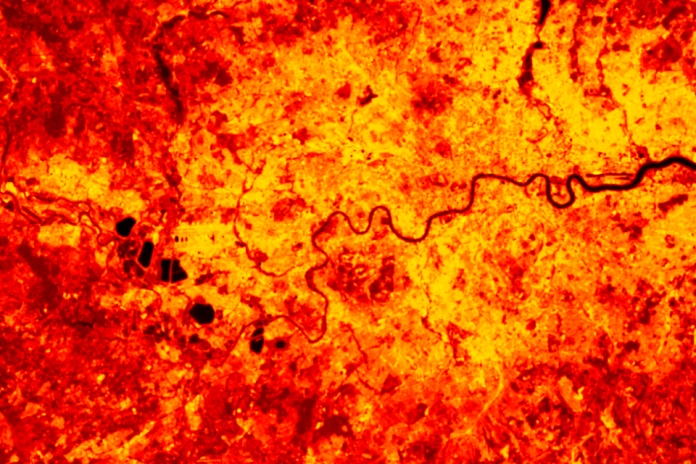UK erdvė Agency will support two new projects. The first envisages using satellite to monitor and map heat in locations at greatest risk from klimato kaita. Development of a prototype Climate Risk Index tool (CRISP) is the second project that is aimed at delivering risk assessments based on satellite and climate data to help the financial sector provide vital insurance products.
Naujausia JK klimato prognozė rodo, kad karšta vasara, kaip 2018 m., greičiausiai įvyks kas antri metai iki 2050 m., o iki to laiko mirčių, susijusių su karščiu, skaičius gali padidėti daugiau nei trigubai, palyginti su dabartiniu lygiu, nesant papildomo prisitaikymo; nuo maždaug 2,000 per metus iki maždaug 7,000. Maždaug 1.2 milijardo žmonių visame pasaulyje iki 2100 m. gali susidurti su karščio streso sąlygomis, esant dabartiniam visuotinio atšilimo lygiui.
Šiame kontekste būtina stebėti ir sudaryti šilumą didžiausios rizikos vietose. Čia praverčia palydovų duomenys.
Jungtinė Karalystė erdvė Agency is going to support two new projects towards this that will provide decision-makers with vital information to help deal with the effects of klimato kaita and improve lives around the world.
The first project is a collaboration between the National Centre for Žemė Observation (NCEO) and Ordnance Survey (OS), which will provide meaningful insights for policy-makers to manage the impacts of klimato kaita in karštieji taškai visoje JK ir už jos ribų. Using NCEO land surface temperature data derived from thermal infra-red sensors in erdvė, OS will then help customers understand and identify how the data can be applied effectively.
Šios Žemė observation data used in the pilot will indicate extreme events and locations that may show greater risk to human health, such as cities where heat stress is a particular concern. By providing easier and better access to insightful evidence through the pilot and through working with the Office for National Statistics, the UK public sector will be able to tackle klimato kaita more effectively with accurate data from erdvė.
Satellite observations of land surface temperatures, and their change, are increasingly recognised as being able to provide unique and detailed knowledge to better facilitate the understanding of klimato kaita and thus to inform planning and ‘climate-adaptive’ policies to deal with extreme events, such as heatwaves.
Prototipo kūrimas Klimato rizikos indekso įrankis (CRISP) is the second project that UK erdvė Agency will support that will see Telespazio UK collaborate with Assimila. This project will deliver risk assessments based on satellite and klimatas data to help the insurance sector provide vital financial products to those at risk from droughts and wildfires.
Using climate data from an ensemble of climate project models, historical reanalysis and Žemė Observation data the prototype will focus on two examples – agricultural drought and wildfires – to show insurance companies how to use the data in their own assessments to benefit the finance sector.
CRISP remiasi Space4Climate (S4C) Climate Risk Disclosure užduočių grupės darbu. S4C darbas suteikia pagrindines technines galimybes nustatyti klimato indeksus, pagrįstus nuosekliu ekstremalių klimato įvykių ir pokyčių nustatymu. jūros lygis derived from different long-term data records of Žemė Observation and klimatas re-analysis datasets.
***
šaltinis:
UK erdvė Agency 2021. Press release – erdvė data helping Žemė adapt to challenges of klimato kaita. Published 8 November 2021. Available online čia






































